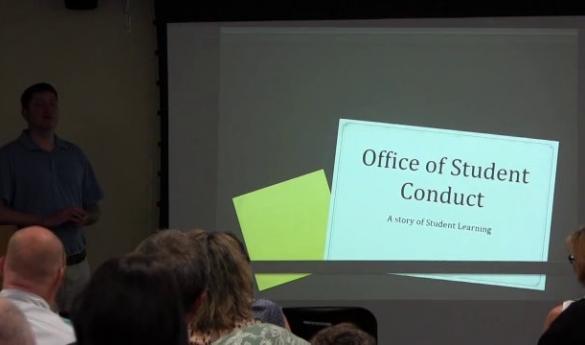Letter to the Editor: How Mason has engaged the student body about a Good Samaritan policy
A recent issue in Fourth Estate discussed concerns regarding the University’s lack of a medical amnesty policy, or a ‘Good Samaritan’ policy as it is commonly known. I write to you today to share the Office of Student Conduct's (OSC) perspective on policy review and change. I write this letter not to engage in a media debate, but rather to address with our community how OSC adapts new policies and how we work with students in this regard.
Let me begin by stating OSC takes drug and alcohol policy violations seriously as they rank among the most common violations each year. We also work closely with WAVES, CAPS, Residential Life, and Student Support and Case Management in an effort to educate our students and assist them in their learning and personal development. Our ultimate goal is to play a role in the education of members of our community, and to help students make informed decisions about their personal behavior.
As an example of our collaboration with students, last spring the Office of Student Conduct worked closely with other University Life staff members as well as students in Student Government to discuss how the university sanctioned drug policy violations (specifically marijuana). Student Government specifically requested a review of the policy, and also presented me with specific data regarding student perspectives on the issue. The result of this collaboration was a change in sanctioning that is currently reflected in our practice and policy. The students involved in this process were respectful and professional, and brought an informed and data-supported perspective to our discussions. As someone who was in all the discussions, I valued their input, and I believe that they found the experience rewarding and beneficial to the student body as well.
I would also like to say that I agree with the commentary in the article that students should seek help at all times when they believe that a fellow community member may be experiencing a medical crisis. Speaking from professional experience, before coming to Mason I worked at an institution where I held a leadership role in the successful implementation of a policy similar to the ‘Good Samaritan’ referenced in Fourth Estate. This process included and valued the perspectives of students who initially brought the concern to my office. Likewise, here at Mason our office is willing to meet with any member of our community who has questions or concerns about our policies, or those interested in revisions to the Student Code of Conduct.
Brent Ericson is Assistant Dean of Students and Director of Student Conduct at George Mason University.
To submit your thoughts or comments, email GMUFourthEstate@gmail.com.

